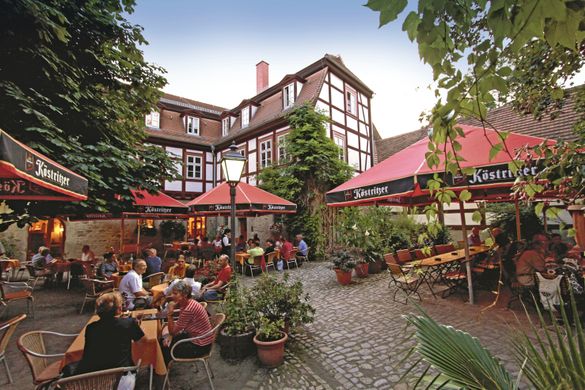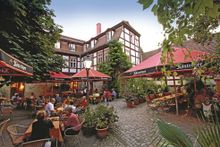 25 Jul 2017
25 Jul 2017
Producing fine wines and delicious beers goes back centuries in Saxony and Thuringia. Discover off-the-beaten culinary treasures with our best-of guide.
Small, but mighty: Saxony's wine-growing region
The sunny and mild valley of the river Elbe is where you find one of Germany's smallest wine-growing regions. This year, the Saxon Wine Route celebrates its 25th anniversary and there's no better time to explore than late summer and autumn: Winding its way on about 38 miles between Pirna and Diesbar-Seusslitz near Meissen, the route offers the best of the region's charming Elbe scenery with its vine-clad terraces and vineyards along the riverbanks. Best of all: the many romantic villages and quaint wine taverns where you can sample the most popular wines grown here, such as Riesling, Müller-Thurgau, Pinot Blanc, Pinot Gris or the local speciality “Schieler”, a blend of red and white grapes.
Tip
Is cycling your thing? Then try the 3-hour circuit route starting and ending in Weinböhla, just east of Meissen. It'll take you past many vineyards and wine taverns and you should stop at as many as you can and enjoy the relaxed atmosphere! For a weekend full of wine, consider the “Saxon Days of the Open Vineyard”, taking place for the 18th time on 26th and 27th August. Vineyards of the region open their doors to the public, offering wine-tastings, local culinary specialities and behind-the-scenes tours. From 29th September to 1 October, you can visit not just one, but two wine festival in both Meissen and Radebeul and try the latest wines from local wine-growers.
Thuringia: on the craft beer trail
If wine doesn't rock your boat, Saxony's direct neighbour Thuringia is a haven for craft beer lovers: The region is home to many small, traditional breweries, producing beer specialities that are not stocked by supermarket chains and are only available in local inns and restaurants. Thuringia's smallest brewery can be found in Singen, close to the Ilm valley cycling path south of Erfurt and Weimar, where beer brewing hasn't changed over the past 100 years, with beer wort fermenting in wooden casks and beer being stored in oak barrels. Brewing takes place once a week. Sample Singen beer in local restaurants, inns or the brewery's own idyllic beer garden!
Further stops on the craft beer trail are Arnstadt, only a few miles south of Erfurt where the town brewery is one of Germany's oldest wheat beer breweries. Visitors can tour the historical brewhouse and enjoy a chilled beer in the brewery's restaurant. Erfurt itself was home to more than 580 beer breweries in the Middle Ages. Head to the historical restaurant “Zum goldenen Schwan” (Golden Swan) to sample self-brewed beers, such as Pilsner, wheat or dark beers, in the atmospheric beer garden.
Tip
In the year of the 500th anniversary of the Reformation, Thuringia couldn't resist producing a special “Luther beer” that comes in different variations such as dark beer, Pilsner and Bock style. If you can't decide which one to go for, simply get the handy “Luther Box”, featuring six bottles and try them all!
Note to the Editor
Thuringia Tourism (www.visit-thuringia.com) and Saxony Tourism (www.sachsen-tourismus.de) are part of the Cultural Heart of Germany, www.cultural-heart-of-germany.com, a tourism initiative of Saxony, Saxony-Anhalt & Thuringia Tourism. The neighbouring states of Saxony, Saxony-Anhalt and Thuringia feature a unique cultural heritage and rich musical tradition that the Cultural Heart of Germany promotes in the UK.
Travel information:
Easy access to the Cultural Heart of Germany: Ryanair to Leipzig and all major airlines to Berlin.
Facebook: www.facebook.com/CulturalHeartofGermany
Twitter: www.twitter.com/CulturalGermany
For press and image enquiries please contact:
B Connects. Barbara Geier Content Services
On behalf of Cultural Heart of Germany (Saxony, Saxony-Anhalt, Thuringia)
barbara@bconnects.net, phone 07983 242 195


